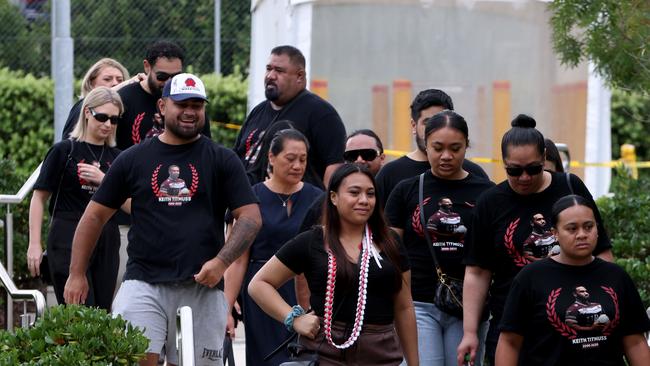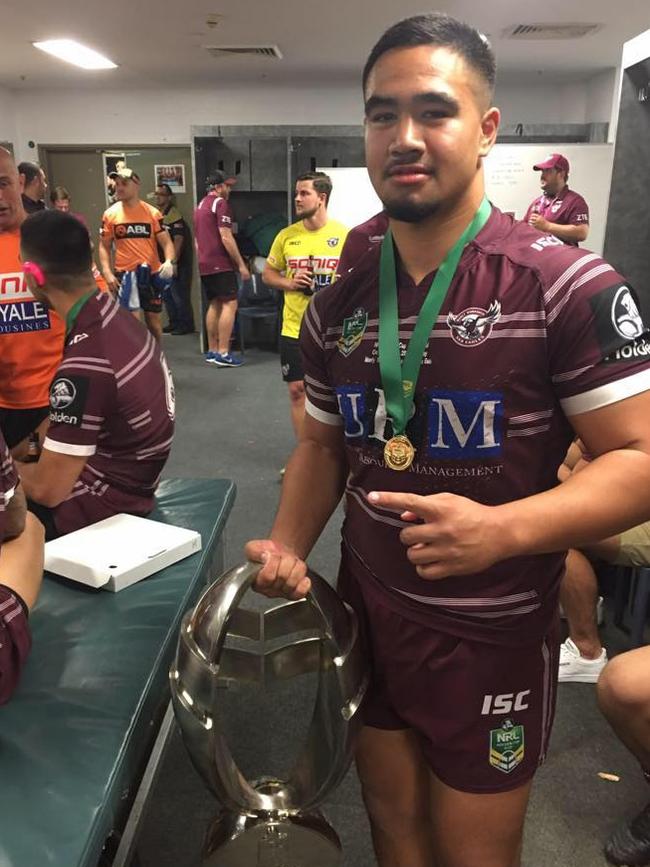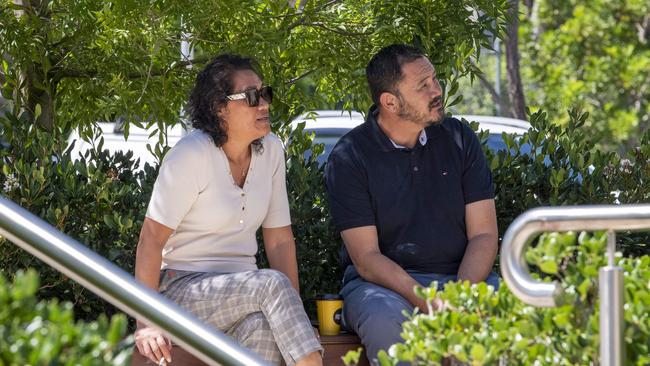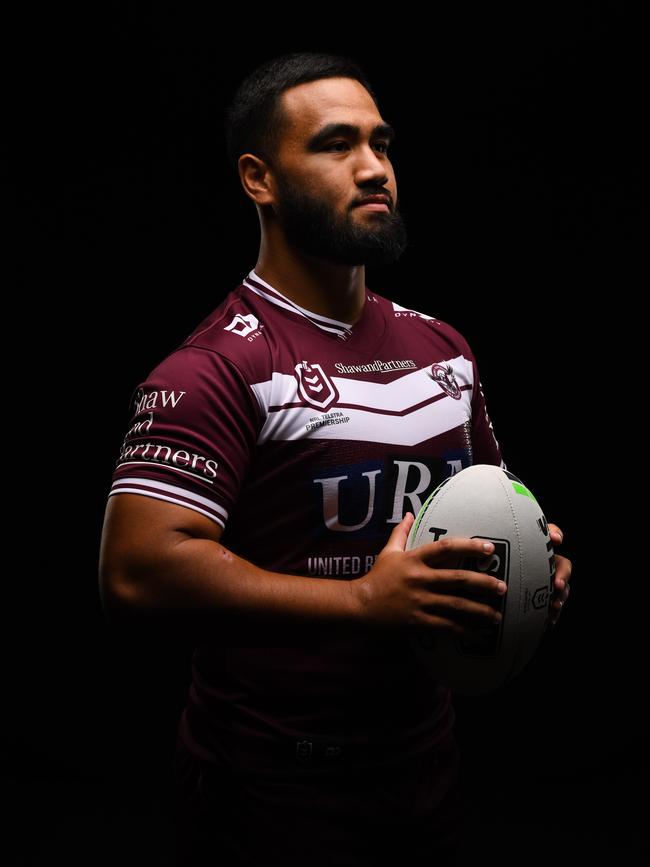Expert call for NRL heat policy and training change in light of Keith Titmuss tragic death
Manly footballer Keith Titmuss died from extreme heat exertion after a two-and-a-half-hour training session that pushed his core body temperature to 41.9degC. His mum hopes his death will not be in vain.

Footballer Keith Titmuss told his mum Lafo how he felt “destined for big things” on the eve of joining the Manly Sea Eagles senior squad. And Lafo too felt for her son that the coming NRL season was going to “be his year”.
Lafo described how 20-year-old son had an “extra bounce in his step” and that “he loved having his own allocated place in the dressing room” at the club’s base in Narrabeen on Sydney’s northern beaches.
But within weeks “Keithy” was dead.
The coronial inquest examining his death on November 23, 2020, has heard Titmuss died from extreme heat exertion after a two-and-a-half-hour training session that pushed his core body temperature to 41.9degC.
Central to the inquest has been whether Manly Sea Eagles complied with its extreme heat policy and listened to a warning from its then club doctor, Luke Inman, that a player could die from extreme heat unless they managed the risks.

For seven days, Lafo, her husband Paul and their extended family and friends have heard the painful details of Keith’s death after Manly’s first pre-season training session, and now it was her time to be heard.
With a photograph of her son in his Manly jersey to her left, Lafo gently touched the letter K pendant on her neck and began to read a statement that covered the joyous life and then heartbreaking sudden loss of her son.
In her statement, Lafo also told how the Manly Sea Eagles – where Titmuss had made his way up through their junior ranks – had brought so much joy to his life. How he would come home and over dinner would entertain the extended Titmuss family with stories about footy training and “the boys”.
“Keithy loved Manly – and he loved his brothers in arms on and off the field,” Lafo said.
The boy that dreamed big, was living and loving his life to the full. “Keithy’s love for life was easy,” Lafo said.
His sudden and tragic death has left a tight-knit family and network friend bereft. In the court on Wednesday, the devastated family and friends of Titmuss wore black T-shirts emblazoned with his image and the number 623 on their backs.
The Manly club posthumously named him as their 623rd first-grade player and presented a Sea Eagles’ jersey with the number on it to his family.
While the family was “honoured” by Manly’s acknowledgment, they are also hoping the game could be made safer.
“We hope that it is instructive not only to the NRL but across Australia and worldwide,” Lafo said. “Heat-stress illness should no longer be underestimated.”
“(We hope) that lives can be saved.”

Over the coronial inquest, evidence was heard about tension within Manly over its adherence to the club’s extreme-heat policy.
In 2017, Manly player Lloyd Perrett collapsed in similar circumstances to Titmuss but he survived when then club doctor Inman treated the player for heat stroke.
Inman, who was not club doctor when Titmuss collapsed, sought to raise awareness about the risks of extreme-heat stress, and in early 2018 sent a prescient warning to senior Sea Eagles coaching and training staff.
Inman wanted reassurance that a portable Kestrel weather device, which measures temperature and humidity, was to be used at every session.
“You are leaving yourself and the club open to litigation if a player suffers heat stroke, or at worst, dies,” wrote Inman in an email to then Manly coach Des Hasler and his high-performance staff.
Dr Inman was concerned the weather device was not being deployed.
“Please, it does not take long to set up,” Dr Inman implored.
Under questioning from counsel assisting the coroner Adam Casseldon SC, Hasler could not recall receiving the email from Inman, nor could he recall ever seeing a Kestrel being deployed at Manly training.
Manly’s heat-stress policy dictated the Kestrel be deployed at every training session in the pre-season if the temperature was above 26 degrees.
The temperature on the day Titmuss died reached a maximum of 24.9degC in the area, while there was no independent objective measure of the temperature inside the dojo, where Titmuss collapsed and suffered a grand mal seizure.

Over the course of the inquest, it was revealed Titmuss had completed two hours and 19 minutes of training outdoors – where he covered 6.7 km – before moving into a “shed” to do at least 10 minutes of highly intensive cardio exercise, which included burpies and wrestling.
Hasler described the session in question as a “solid” “8/10” training session, while Manly’s head trainer Alex Ross told the inquest the weather was not at the point where the Kestrel would be deployed.
It appears the Manly extreme-heat policy did not cover conditions inside the dojo.
Over the course of the inquest, details came to light about how intense the heat was in the club’s “dojo”, where they were to perform wrestling and cardio exercises.
Manly star Josh Schuster – Titmuss’s best friend – told the inquest on the opening day it was the “hottest he’s ever been” and feared it would be held against them if they didn’t finish the session. Schuster said it was 33 degrees inside the dojo.
There was conflicting evidence between Manly staff and independent witnesses over how hot it was inside the dojo. The two paramedics who attended the scene described conditions inside the “dojo” as “hot and humid”, “hot and stuffy”, “oppressive” with poor ventilation and “no airconditioning”.
Hasler, however, gave evidence the temperature inside the dojo was “not uncomfortable.’
Schuster told the court Titmuss then became unconscious in the dojo.
“I knew it was a tough session,” Schuster said. “I thought (Titmuss) was just lying down and relaxing. (But) he wasn’t responding to us. He just said his name a few times. We were trying to move him to see if he was all right, but his eyes were closed. He was breathing, but he wasn’t responding.”
Titmuss then started to convulse, his body jerking, as it seized with force and he moved metres along the dojo floor.
When paramedics arrived, they confronted a “very chaotic scene” with Titmuss having a seizure in what they described as hot, humid and oppressive conditions.
Matthew Grant, one of the first paramedics to arrive on the scene, noticed Titmuss body temperature.
“(He) was very hot … you could feel the heat radiating off Mr Titmuss,” Grant said.
It took more than 50 minutes for the paramedics to stabilise Titmuss so he could be transferred first to Northern Beaches Hospital and then Royal North Shore, where he later died.
It was also heard Titmuss had low aerobic fitness, both known risk factors for heat stress. Titmuss had a body mass index of more than 35 when he returned to pre-season training weighing 116.8kg, having gained 4kg over the eight-week off-season period.
The inquest heard of a “warrior mentality” at Manly that encouraged players to push themselves to the limit and not admit weaknesses.
“That’s one way of putting it,” said Dr Simon Quilty, an expert in exertional heat stress. “Others have termed it a highly motivated setting. In context, these are elite players with a determination to keep up with their peers.”
A sports science expert, Professor Aaron Coutts, told the coroner on Wednesday it would be helpful to spell out a gradual return to full training schedule in hotter months rather than leave it open to interpretation.
Professor Coutts suggested the NRL should mandate an acclimatisation policy that built up to full speed over a period of two weeks.
He said training in the first week should be at 50 per cent, building to 75 per cent in the second week and in the third returning to full load.

Coutts said a mandated acclimatisation policy would “address the warrior mentality by modifying the training load” and removing responsibility from individuals to admit difficulty with training.
NRL star Schuster, who was in the dojo that day, was asked by counsel assisting the coroner, Adam Casseldon SC, if players felt able to put their hands up and take a break if they felt fatigued.
“Not with Des as our coach,” Schuster said, indicating players were expected to push through the pain barrier.
In a police-recorded videotaped “walk through” of the Manly locker room, the “warrior mentality” at the Sea Eagles was proudly on display.
Banners proclaiming “We Are Manly” and “Do Your Job” hung in the locker room.
The video showed the name “Titmuss” – who had just been named as part of Manly’s top 30 squad – emblazoned on the partition. Vision showed Keith’s towel still on his bench and a pair of red running shoes tucked underneath.
Titmuss had played league from the age of five. He joined Mounties Rugby League Club and in his debut season was the leading tryscorer.
He went onto become a rising star in junior rugby league and union ranks. As a brilliant teen, he was lured across from Westfields Sports High to Newington College, where he was awarded a lucrative scholarship to play schoolboy rugby. The NRL won his heart in the end and Manly was his rugby league home.
On Wednesday, Lafo also told how her son was a “salt of the earth” and a “social butterfly”, netting friends from school, to union, to league and beyond.
“Keithy has been described as unassuming, honest, kind, respectful and loved by so many,” Lafo said.
The deputy state coroner Derek Lee will hear final submissions from the parties next month and then make recommendations that are likely to have far-reaching implications for every football code in the country.

To join the conversation, please log in. Don't have an account? Register
Join the conversation, you are commenting as Logout